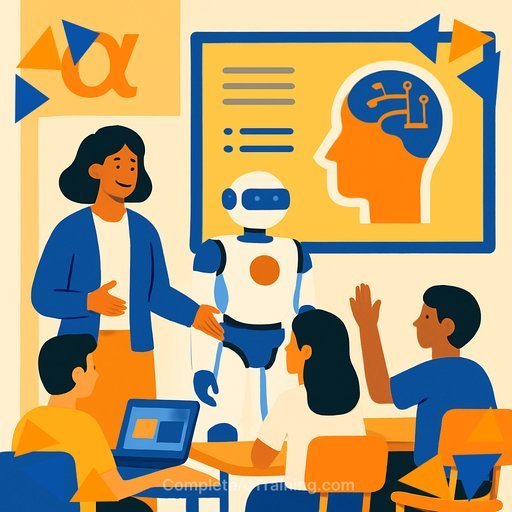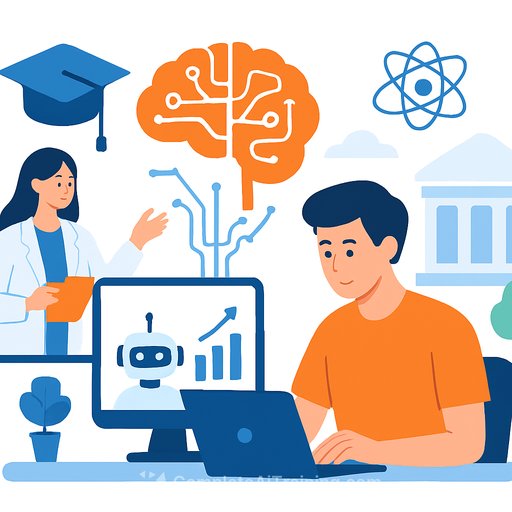AI to be taught from Class 3 in 2026-27: What educators need to do now
Artificial Intelligence will be integrated into India's school curriculum from Class 3 onward starting 2026-27. The Ministry of Education has asked the CBSE to develop a framework so students and teachers are ready for a technology-driven future.
"We need to move fast so that students and teachers are properly aligned with this technology over the next two to three years. The challenge will be to reach out to over one crore teachers across the country and orient them in imparting AI-related education," said Sanjay Kumar, School Education Secretary. He noted that a pilot is already training teachers to use AI tools for lesson planning.
Where things stand today
Over 18,000 CBSE-affiliated schools already offer AI as a skill subject from Class 6 (15-hour module) and as an optional subject in Classes 9-12. Extending AI to younger grades is a strategic move to build digital literacy and problem-solving early.
Why this matters for schools
A NITI Aayog report projects around two million traditional jobs could be displaced while eight million new roles may emerge-if India builds the right ecosystem. It calls for coordination among government, industry, and academia, plus stronger compute and data infrastructure to develop future talent.
- Expect tighter alignment between the India AI Mission and teacher training efforts.
- Plan for curriculum updates, teacher skilling, and school-level AI usage policies well before 2026.
Action plan for school leaders (next 18-24 months)
- Teacher capacity: Identify AI champions per department. Run monthly PLCs on AI-assisted lesson planning, assessment design, and classroom management. Build a disclosure policy for AI use in teaching and learning.
- Infrastructure: Audit devices, bandwidth, and classroom displays. Provision safe access to age-appropriate AI tools, with filtering and logging. Pilot a small set of vetted tools rather than many untested apps.
- Policy and safety: Draft an AI Acceptable Use Policy. Include data privacy, attribution, age-appropriate usage, and consent. Align with the Digital Personal Data Protection Act (DPDP) and your state guidelines.
- Curriculum mapping: Integrate AI concepts into existing subjects instead of adding heavy standalone periods in lower grades. Use project-based tasks where AI supports inquiry and creativity.
- Assessment: Update rubrics to distinguish process, originality, and AI-assisted work. Use portfolios and performance tasks. Teach students to cite AI outputs and reflect on tool limits.
- Community and partnerships: Connect with nearby colleges and industry mentors for guest sessions and real-world projects. Share exemplar units and rubrics across clusters.
- Budgeting: Allocate for teacher PD, devices, and a small stack of tools. Prefer tools with admin controls, student privacy assurances, and clear data policies.
Suggested scope by grade band
- Classes 3-5: Patterns, instructions, and simple algorithms (unplugged first). Responsible use, fact-checking, and basic prompts with guardrailed chat tools.
- Classes 6-8: Data basics, summarization, structured prompting, bias and fairness, image/text generation ethics. Short cross-curricular projects.
- Classes 9-10: Research workflows with AI, coding with AI assistants, verification strategies, and domain projects (science, social science, languages).
- Classes 11-12: Advanced electives, capstones, internships, and career-linked micro-credentials aligned to industry tools.
Two-week teacher pilot template
- Pick a unit already scheduled this term (e.g., ecosystems, ratios, narrative writing).
- Define outcomes and a rubric that includes proper AI use, citation, and reflection.
- Select 1-2 tools with admin controls; prepare a quick start guide for students.
- Run the unit, collect artifacts, and hold a 45-minute debrief on what worked and what to refine.
Metrics that matter
- Teacher confidence: pre/post self-ratings on AI-assisted planning and assessment.
- Student outcomes: rubric scores on inquiry, creativity, and ethical use.
- Tool efficacy: usage logs, cost per class, incident reports.
- Equity: access across sections, device availability, language support.
Key quotes and signals
"The CBSE is developing the framework for AI integration across grades," said Sanjay Kumar. The pilot for teachers using AI in lesson planning is underway, signaling that implementation guidance and PD models will follow.
Helpful resources
- CBSE Skill Education: AI subject overview
- IndiaAI: National initiatives and updates
- Complete AI Training: Courses by job role (useful for teacher PD)
Bottom line for educators
The policy direction is clear and the timeline is set. Build teacher confidence, update policies, and run focused pilots now so your school is classroom-ready by 2026-27.
Your membership also unlocks:






